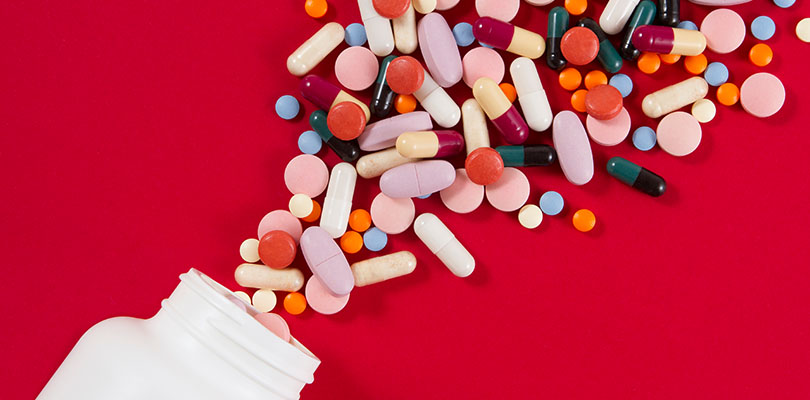What Are the Best Vitamins for ADHD?
Vitamins and minerals are essential for the healthy function of all your body’s systems, including your brain. Many different vitamins are involved in the production of neurotransmitters. These are chemical messengers which influence your thinking, behavior, and mood.
It has been suggested that because of their influence on neurotransmitters, vitamin deficiencies could play a role in many different mental health issues, including ADHD. In fact, research suggests that topping up on your vitamins could help with ADHD symptoms such as hyperactivity, inattention, and impulsivity to name just a few.
For most people, it is possible to get all of the vitamins and minerals you need by eating the right foods. However, people with ADHD may struggle to eat a balanced diet, making it harder to get the nutrients they need from natural sources.
In these cases, a supplement may help, but it is possible to have too much of a good thing. In high doses, certain vitamins can be toxic, so if you decide to take a vitamin supplement for ADHD, talk to your physician first. They will be able to tell you which supplements are most appropriate for you and in what dosage.
That said, it is tough to overdose on vitamins from food, so without further ado, let’s take a look at some of the best minerals and vitamins for ADHD, and where to find them.
Vitamin B6
B6, also known as pyridoxine, is one of the families of B vitamins which plays a crucial role in energy release, the nervous system, and mood.
Vitamin B6 is especially important for people with ADHD as it can help to improve alertness while relieving irritability, tiredness, and anxiety.
Some foods which are particularly rich in vitamin B6 include:
- Meat, especially pork
- Poultry
- Fish
- Milk and dairy products
- Eggs
- Fortified bread and breakfast cereals
Vitamin C
Vitamin C has many important functions within the body. It helps to keep your cells healthy and plays a part in wound healing. It also aids the absorption of iron, another essential nutrient for people with ADHD.
Vitamin C is thought to benefit ADHD symptoms by influencing the levels of two neurotransmitters called dopamine and norepinephrine. These are responsible for feelings of motivation and alertness, as well as being involved in the stress response.
It is difficult to overdose on vitamin C, but it can interfere with some medications. Therefore, you should leave at least one hour between taking vitamin C supplements and your ADHD medications.
Vitamin C can be found in many different fruits and vegetables. Some of the best are:
- Citrus fruit
- Berries
- Leafy greens
- Bell peppers
Vitamin D
Vitamin D is important for people with ADHD as it could help to improve attentiveness and reduce hyperactivity, impulsivity, and oppositional behavior. One study found that children with ADHD had higher rates of vitamin D deficiency compared with others, and that treatment with this supplement improved their symptoms significantly.
One of the best sources of vitamin D is natural sunlight, but it can also be found in these foods:
- Oily fish (salmon, mackerel, sardines, etc.)
- Red meat
- Liver
- Eggs
- Butter and margarine
- Fortified breads and breakfast cereals
Iron
Iron is one of the most important micronutrients for anyone with ADHD. It helps with the transport of oxygen in your bloodstream and is involved in the production of dopamine and norepinephrine.
Although iron is an essential mineral, taking too much can be dangerous. If you take an iron supplement, be cautious and watch out for symptoms such as constipation, nausea, vomiting, and stomach pain. If you experience any of these, contact your physician straight away.
Some good dietary sources of iron include:
- Red meat
- Liver
- Leafy greens
- Beans
- Dried fruit
- Cocoa
- Dark chocolate
- Fortified bread and breakfast cereals
Magnesium
Magnesium is another important mineral which is often deficient in people with ADHD. It influences the neurotransmitters GABA and glutamate which are responsible for attentiveness among other things. In people with ADHD, magnesium deficiency can lead to symptoms such as restlessness, irritability, confusion, anxiety, and lack of focus.
Luckily, magnesium can be found in a wide variety of foods. Some of the best include:
- Leafy greens
- Whole grains
- Nuts
- Fish
- Meat
- Dairy products
Zinc
Last but not least, zinc is one of the best minerals for ADHD. It is thought to regulate dopamine levels and reduce symptoms such as hyperactivity and impulsivity. It may also improve the way that the common ADHD medicine (i.e., methylphenidate) works.
Zinc can be found in many different foods including:
- Meat, especially beef
- Shellfish
- Shrimp
- Pumpkin seeds
- Whole grains
Vitamins for ADHD: The Bottom Line
Many different vitamins and minerals may help with the symptoms of ADHD. These can be found in a variety of foods, and the best way to ensure you are getting enough is by eating a healthy, balanced diet.
You can also take vitamins for ADHD as a supplement, but these will only work if you have a vitamin deficiency. With supplements, you are also at greater risk of an overdose if you take too much. Therefore, you should always talk to your physician or a dietician before starting to take vitamin supplements, especially if you are already on other medication for ADHD.
